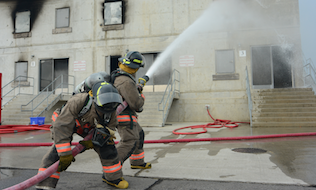
The City of Mississauga’s fire and emergency services has piloted a workplace mental-health risk assessment and consulting service as it moves towards implementing a mental-health strategy.
The digital assessment, a tool developed by Sun Life, aims to help employers develop a plan to build a more mentally healthy workplace for their employees.
The Ontario city’s fire and emergency service began working with Sun Life in early 2015, says assistant chief Shawn Matheson. “At the same time, we were trying to frame a new mental-health strategy for the department, so the work was perfect because it was fitting within a strategic plan we were already working on. The gap analysis report came back. . . . it identified opportunities for us to work on and it is helping us frame our strategic plan for mental health.”
Read: Ontario passes legislation to support first responders with PTSD
Matheson’s group was one of the first Sun Life spoke to in the early process of developing the tool, says Marie-Hélène Pelletier, assistant vice-president of workplace mental health at Sun Life. “They were actually a key player in us developing the tool the way we did.”
The assessment tool aligns with the Mental Health Commission of Canada’s national standard for psychological health and safety. Employers complete an online risk assessment by answering 150 questions to get an immediate snapshot of how their organization is faring in relation to the 13 psychological risk factors outlined in the national standard.
“The person who completes the questionnaire is the employer, but the questions themselves indirectly bring in the voice of the employees because it’s asking about absenteeism, if you have an employee satisfaction survey, use of disability, all kinds of information,” says Pelletier.
The initial results pinpoint the risk factors needing attention at a participating organization. After that, Sun Life’s integrated health solutions consultants followup with a detailed plan to help employers prioritize and take action on their results with the aim of building a more psychologically healthy and safe workplace.
“It’s basically putting something concrete on the path of increasing workplace mental-health strategies,” says Pelletier. “It’s adding that concrete, actionable item that employers can take to move forward.”
Read: Mental Health Commission publishes five-year strategic plan
In February 2016, the Mississauga fire and emergency service filled out the questionnaire portion of the assessment. The work has already led to a number of efforts to support its first responders.
“We are looking to leverage mental-health programs that are already out there, including Road to Mental Readiness, which has been custom designed for the fire service,” says Matheson. “We’re working on return-to-work support for staff who have left the workplace for either mental or physical issues, as well as support for their families.
“We’re also working on leadership training around supporting mental health, access to a clinician network that would essentially do customized work for Mississauga fire and perhaps the City of Mississauga; and, like anyone else working on mental-health strategies, a whole bunch of tactics to try to reduce stigma.”
Read: Margaret Trudeau on the role of kindness in workplace mental health
